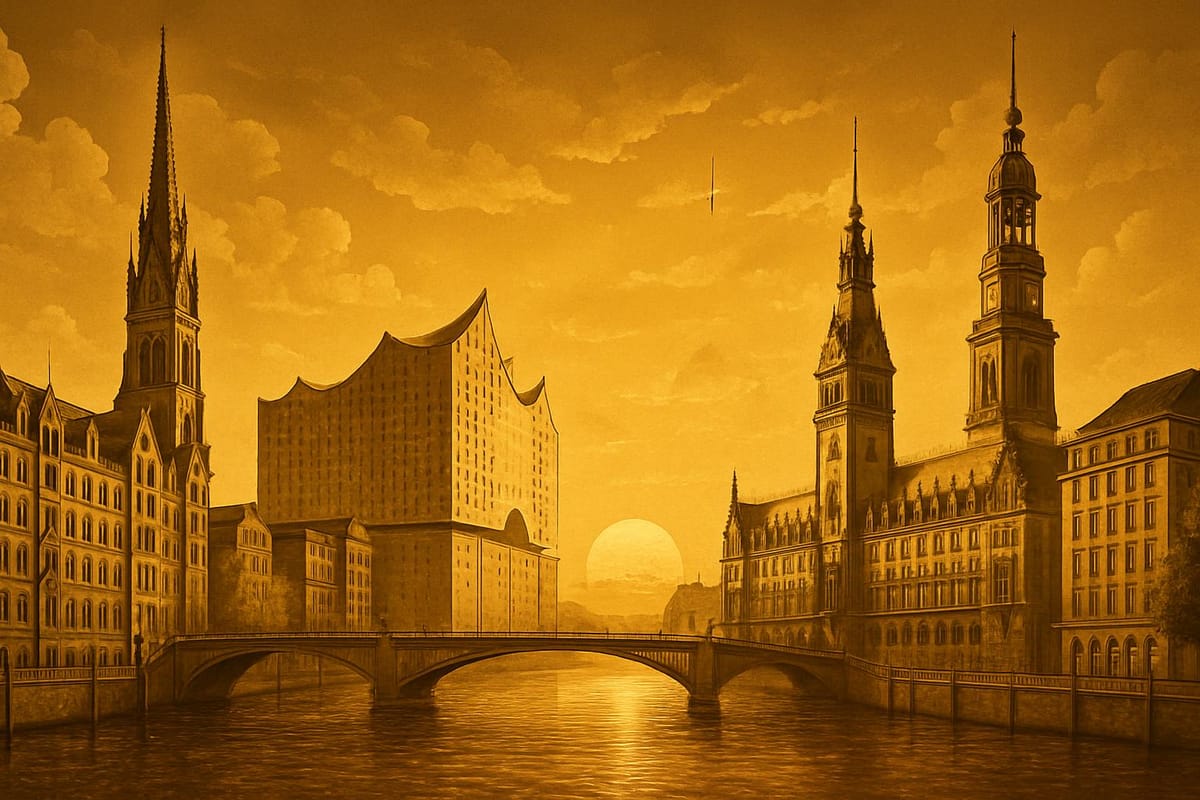Hamburg

Important things to know about Hamburg
Hamburg in Germany presents a distinctive blend of maritime spirit and modern urban life, where the rhythm of the port and the waterways shapes everyday living and the city’s identity; a dynamic economy built on shipping, media, logistics and creative industries sits alongside vibrant neighborhoods that mix historic character with contemporary development, making living in Hamburg appealing for professionals, students and families alike. The city’s extensive network of canals and rivers creates waterfront boulevards and quiet residential quarters, while a strong commitment to sustainability and green planning is visible in parks, bike-friendly streets and ambitious environmental initiatives that aim to balance growth with quality of life. Cultural diversity permeates local dining, music scenes and community events, reflecting an international population that contributes to a cosmopolitan yet approachable urban atmosphere. Well-developed public transport, a broad education and research landscape and a thriving startup scene underscore Hamburg’s role as a northern European hub for innovation and knowledge-based business. Seasonal shifts bring a mix of brisk maritime weather and mild summers, influencing outdoor life on terraces and promenades, and the city’s neighborhoods each offer distinct personalities-from bustling commercial districts to quieter, leafy residential lanes. For those seeking a blend of urban convenience, green spaces, and the unique energy of a city tied to the sea, Hamburg combines tradition with forward-looking ambition in a way that continues to attract people and investment, making the city of Hamburg a compelling place to work, study and settle.
Sightseeing hot-spots in Hamburg
Hamburg is a city of water and architecture, and the sightseeing highlights of Hamburg start with its iconic harbor. The Port of Hamburg is Europe’s “Gateway to the World” and offers dramatic views, especially around the modern Elbphilharmonie, whose glass waves crown an old warehouse building. Strolling through the Speicherstadt, the historic red-brick warehouse district and a UNESCO World Heritage site, visitors encounter narrow canals, evocative bridges and atmospheric museums that make Hamburg sightseeing feel like stepping into a maritime novel. Photography enthusiasts and culture seekers alike will find the juxtaposition of historic warehouses and contemporary glass a compelling visual narrative.
A boat tour on the Alster lakes and canals remains one of the best ways to experience the city, with serene water vistas contrasting the bustle of the harbor. Urban green spaces such as Planten un Blomen offer seasonal botanical displays and open-air concerts, while the baroque tower of St. Michaelis (known as St. Michael’s Church) rewards climbers with panoramic city views. For visitors interested in art and history, the Kunsthalle and various maritime museums enrich the list of tourist attractions in Hamburg, making the city attractive not only for its skyline but for its museums and historic churches.
Nightlife and markets bring a different energy to the things to do in Hamburg. The vibrant Reeperbahn district is famous for music clubs and late-night entertainment, while the traditional Fischmarkt (Fish Market) on Sunday mornings captures the city’s lively trading spirit. Culinary tours, harbor cruises, and cycling along the Elbe promenade are practical ways to cover many sightseeing highlights of Hamburg in a short visit, ensuring a memorable mix of culture, history and modern urban flair.
Hotels to enjoy in Hamburg
Hamburg offers a rich selection of hotels in Hamburg that suit every traveler, from business guests to weekend explorers. Whether you prefer a luxury stay with panoramic views of the Harbour or a charming boutique hotel tucked into the historic Speicherstadt, the city’s accommodation scene blends modern comfort with maritime character. Many Hamburg hotels are conveniently located near iconic attractions like the Elbphilharmonie, the Alster lakes, and the lively Reeperbahn in St. Pauli, making it easy to plan sightseeing, concerts, and nightlife without long commutes. For visitors focused on business or transport links, options close to Hamburg Hauptbahnhof and HafenCity provide quick access to public transit, while those seeking a quieter atmosphere can find secluded options along canal-front streets and in leafy neighborhoods. The diversity of rooms and services-from family-friendly suites to sleek, tech-forward rooms-means finding the right hotel in Hamburg for your needs is straightforward.
When choosing from the many hotels in Hamburg, consider what matters most: proximity to attractions, on-site amenities, or a specific vibe like historic charm or contemporary design. Prices range from affordable budget hotels and well-rated hostels to high-end, five-star properties that emphasize spa treatments, gourmet dining, and personalized concierge services. Booking strategies, like reserving early for major events or comparing cancellation policies, can secure the best rates and flexible plans. Many travelers find that focusing on neighborhoods-HafenCity for modern architecture, Speicherstadt for UNESCO vibes, or St. Pauli for nightlife-helps narrow choices quickly. With its efficient transit system and compact city center, finding ideal accommodation in Hamburg is simple, and a well-chosen hotel can turn a visit into a memorable experience blending culture, cuisine, and the city’s unmistakable maritime spirit.
Restaurants to try in Hamburg
Hamburg’s dining landscape mixes historic port traditions with contemporary flair, and the restaurants of Hamburg reflect that lively contrast. From the bustling fish stalls of the Fischmarkt to elegant waterfront tables in HafenCity, you can taste the city’s maritime roots through fresh seafood, classic Fischbrötchen, and hearty regional dishes like Labskaus. Neighborhoods such as St. Pauli and the Reeperbahn offer late-night bites and international street food, while the leafy avenues around the Alster host refined bistros and family-run taverns. Whether you’re seeking a cozy tavern serving local beer or a modern open-kitchen venue, dining options in Hamburg invite exploration and discovery across a vibrant culinary map.
The variety among Hamburg restaurants makes the city appealing for every kind of diner, from travelers hunting Michelin-starred experiences to locals favoring comfortable, affordable eats. Many chefs emphasize sustainable sourcing and local produce, so menus often change to reflect seasonal catches and regional farms. Creative wine bars, craft-beer pubs, and sun-drenched terraces along the Elbe complete the offering, creating memorable settings for both casual dinners and special occasions. For searchers looking for "dining in Hamburg," the city’s strong gastronomic reputation and diverse options ensure high visibility online and a rich, flavorful experience in person.
Best shopping stops in Hamburg
Hamburg’s retail scene is a dynamic mix of classic department stores, luxury avenues and creative neighborhoods, making shopping in Hamburg appealing to every taste and budget. The bustling heart of the city centers around Mönckebergstraße, a long pedestrianized high street lined with well-known chains and big-name retailers, while the elegant Jungfernstieg along the Inner Alster offers a scenic shopping experience with premium boutiques and flagship stores. For high-end fashion and designer labels head to Neuer Wall, where international luxury brands and refined showrooms sit side by side with historic facades. Department store enthusiasts will appreciate Alsterhaus and the modern Europa Passage mall, both offering curated selections of cosmetics, homeware and international fashion. The city’s waterfront districts, including Speicherstadt and HafenCity, add maritime charm to your purchases with specialty shops, design stores and distinctive souvenirs inspired by Hamburg’s port heritage.
Beyond the main arteries, the best shopping areas in Hamburg reveal themselves in lively neighborhoods and markets that showcase local creativity and sustainable trends. The Schanzenviertel and Karolinenviertel are celebrated for independent boutiques, vintage stores and concept shops where you can discover unique clothing, handmade jewelry and contemporary home goods. Markets like the Sunday Fish Market and the long-standing Isemarkt offer fresh produce, artisanal foods and an eclectic mix of stalls ideal for tasting local flavors and picking up original gifts. Whether you’re after luxury labels, local designers, maritime souvenirs or secondhand treasures, Hamburg’s diverse retail landscape delivers memorable finds and authentic shopping experiences that capture the city’s cosmopolitan and historic spirit.
Nightlife highlights in Hamburg
Hamburg nightlife pulses through the streets of St. Pauli and the famous Reeperbahn, where neon signs, theater shows and late-night clubs create an electric atmosphere. From legendary live venues on Große Freiheit to underground techno clubs in Sternschanze, the city caters to every music taste with vibrant DJ sets, indie bands and intimate jazz nights. Food stalls and cocktail bars spill onto sidewalks, offering local craft beer and inventive drinks that keep the party going until dawn. Visitors searching for the best nightlife in Hamburg will find a mix of authentic local hangouts and international hotspots, all within walking distance on the lively Kiez.
Beyond bars and clubs, Hamburg’s evening scene is shaped by stunning harbor views and cultural late-night options such as performances at the Elbphilharmonie or moonlit walks along the Landungsbrücken. Harbor cruises and waterfront terraces give a calmer alternative to the dancefloors, perfect for couples or anyone wanting scenic photo opportunities and relaxed conversation. Whether you prioritize live music, late-night dining, or all-night dancing, Hamburg offers a diverse nightlife experience that ranks among Germany’s most dynamic, accessible and memorable destinations.
Getting around in Hamburg
Hamburg’s travel scene smoothly links air and rail travel: Hamburg Airport (Flughafen Hamburg) sits just outside the city center and is well integrated into the city’s public transport network, with the direct S-Bahn S1 service providing a convenient, roughly 25–30 minute ride to Hamburg Hauptbahnhof and frequent departures that make airport transfers easy for both business and leisure travelers. From the Hauptbahnhof, passengers can access an extensive rail hub with regular regional services and high-speed ICE trains offering connections to major German cities, while the local U-Bahn and tram networks, plus buses operated under the HVV system, ensure efficient onward journeys across the city and suburbs. For visitors concerned about timing, luggage or late arrivals, the combination of airport S-Bahn links and the central train station’s long-distance services reduces transfer stress and supports flexible itineraries, making Hamburg attractive for multi-modal trips; travelers should check HVV ticket zones and real-time schedules for the best connections, and expect reliable infrastructure and frequent services that together define Hamburg’s strong airport and train situation.
Culture must-see's in Hamburg
Hamburg, Germany pulses with a rich mix of music, theater, and nightlife that makes it one of Europe's most dynamic cultural destinations. The city’s skyline is dominated by the iconic Elbphilharmonie, a modern concert hall whose acoustics and architecture draw classical music lovers and curious travelers alike. Down in St. Pauli the legendary Reeperbahn still hums with live clubs, cabaret, and the club culture that launched the Beatles into fame, while world-class institutions like the Hamburg State Opera and the Deutsche Schauspielhaus stage bold productions year-round. Whether you’re seeking a stirring symphony, an avant-garde performance, or a late-night gig by emerging local bands, Hamburg’s cultural calendar is packed with experiences that showcase the city’s artistic energy and cosmopolitan spirit.
Beyond performance art, Hamburg’s cultural highlights extend through its museums, historic quarters, and waterfront life that celebrate the city’s maritime heritage and contemporary creativity. The red-brick warehouses of the Speicherstadt and the modern developments of HafenCity provide dramatic backdrops for photography and strolls, while museums like the Kunsthalle and Deichtorhallen host important collections of classic and contemporary art. Food markets, river cruises, and the bustling fish market add sensory layers to the cultural visit, and frequent festivals, galleries, and street art projects keep the urban fabric lively and evolving. For travelers searching for a blend of history, innovation, and artistic discovery, Hamburg offers cultural highlights that are as varied and vibrant as the city itself.
History of Hamburg
Hamburg's story begins as a strategic riverside settlement on the Elbe, growing from a medieval market town into one of Europe's most influential trading centers. The history of Hamburg is inseparable from maritime commerce: by joining the Hanseatic League, the city asserted its independence as a powerful city-state and developed extensive trade networks across the North and Baltic Seas. Over centuries, Hamburg's harbor expanded, warehouses and shipyards clustered along the riverbanks, and iconic districts like the Speicherstadt were built to serve commerce and logistics. The city endured fires, plagues, and political upheaval, yet its resilience was remarkable-events such as the Great Fire of 1842 prompted large-scale rebuilding that modernized streets and port infrastructure, while the industrial revolution accelerated growth, bringing rail connections, shipbuilding, and a diverse workforce that transformed the urban landscape. Throughout this period, Hamburg's identity as a cosmopolitan, mercantile hub linked to global shipping lanes shaped everything from its architecture to its social fabric.
The 20th century brought dramatic change as Hamburg became a focal point during conflicts and a center of postwar reconstruction. Devastation in World War II damaged large swaths of the city and port, but intensive rebuilding and economic renewal in the postwar decades restored Hamburg's position as Germany's premier Port of Hamburg and a major European logistics center. Cultural revival followed industrial renewal: the rise of the Reeperbahn entertainment quarter, the emergence of music culture that launched international careers, and the recent addition of architecturally bold landmarks like the Elbphilharmonie reinforced the city's reputation as both a commercial powerhouse and a cultural destination. Today, Hamburg balances its maritime traditions with innovation in media, aviation, and technology sectors while preserving historic neighborhoods and waterfronts. The ongoing story of the history of Hamburg reflects adaptation and reinvention-an urban narrative of trade, resilience, and creativity that continues to attract tourists, businesses, and historians interested in how a port city on the Elbe shaped both regional development and global commerce.



